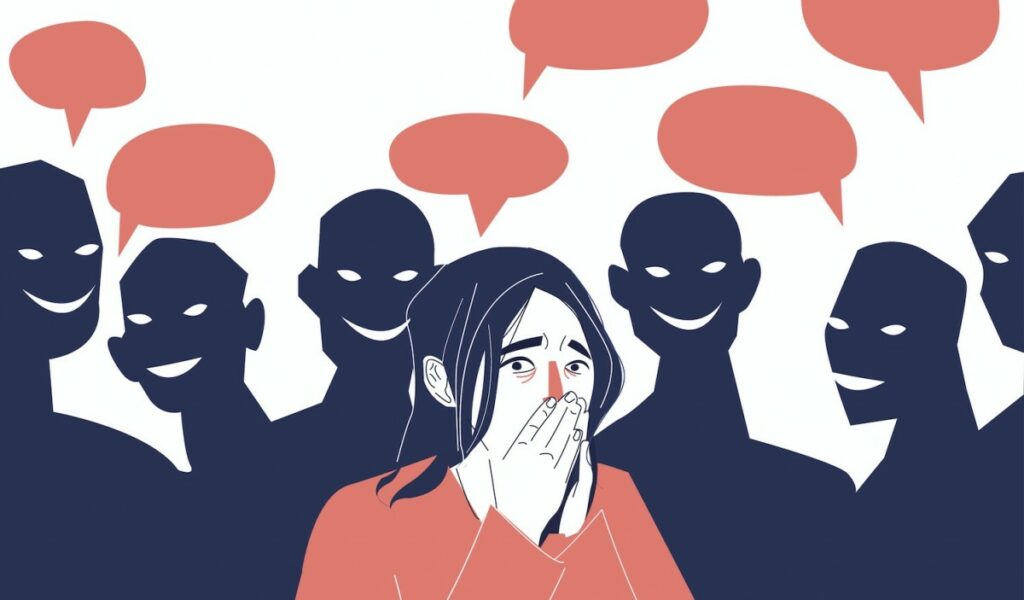Social anxiety is a widespread disorder that affects millions of individuals globally. It is characterised by a strong anxiety about being criticized, rejected, or judged in social settings. The avoidance of social situations, loneliness, and a detrimental influence on daily life might result from this phobia. Although managing and overcoming social anxiety can be difficult, it is doable with the correct tools and approaches.
Table of Contents
Symptoms of Social Anxiety
Social anxiety can manifest in many ways, and symptoms can vary from person to person. Some common symptoms of social anxiety include:
- Sweating, shaking, or trembling
- Increased heart rate or palpitations
- Blushing
- Nausea or stomach discomfort
- Difficulty speaking or stuttering
- Feeling self-conscious or embarrassed
- Avoidance of social situations
- Fear of being the center of attention
- Difficulty making eye contact
- Negative thoughts or beliefs about oneself
These symptoms can be distressing and interfere with daily life. Coping with social anxiety involves learning to manage these symptoms effectively.

Coping Strategies for Social Anxiety
Recognize Your Triggers
Finding your triggers is one of the first stages in overcoming social anxiety. This may entail recording your nervous feelings and ideas in a journal or diary. You may start preparing for and coping with those situations once you are aware of what makes you anxious. For instance, if speaking in front of groups of people makes you anxious, you might use deep breathing or visualisation exercises to help you relax before the event.
Practice Relaxation Techniques
Social anxiety can be controlled with the aid of relaxation techniques such progressive muscle relaxation, deep breathing, and meditation. These methods can assist in relaxing your body and easing tension. For instance, deep breathing is gently inhaling through your nose and then exhaling through your mouth. To assist you relax before entering a social environment, you might practise this approach.
Challenge Your Negative Thoughts
A person’s self-defeating thoughts and beliefs frequently feed social anxiety. These ideas could be unfounded and unreasonable. Challenge these unfavourable ideas by asking yourself if they are sensible or if there is evidence to back them up as a technique to deal with social anxiety. Ask yourself if there is any proof for your beliefs, for instance, if you fear being evaluated by others. Often, these negative beliefs are unfounded, so confronting them can help lower anxiety.
Gradual Exposure
It can be intimidating to face your anxieties, but exposing yourself to them gradually can help you gain confidence. You can reduce your anxiety by progressively exposing yourself to social settings that make you uncomfortable. Begin by briefly attending a social event, then gradually increase your exposure over time. You may become less sensitive to the circumstance and gain more confidence as a result.
Seek Professional Help
It may be useful to seek professional assistance if your social anxiety is negatively affecting your daily life. A therapist can offer support and assistance in helping you create coping mechanisms. CBT, or cognitive-behavioral therapy, is a successful treatment. The goal of CBT is to challenge negative thought patterns and beliefs. This may lessen tension and boost self-assurance.
Practice Self-Care
It’s crucial to look after oneself when battling social anxiety. Get enough sleep, exercise frequently, and eat a balanced diet. Exercise is a fantastic technique to lower anxiety and lift your spirits. Take part in enjoyable activities and give yourself space to unwind. It’s also crucial to practise self-compassion and refrain from being overly critical of yourself. Keep in mind that overcoming social anxiety requires time and perseverance.
In conclusion, managing social anxiety is doable with the appropriate methods and strategies. You may control social anxiety and lead a happy life by being aware of your symptoms, using relaxation techniques, questioning your negative beliefs, gradually exposing yourself to new situations, getting expert help, and taking care of yourself. Remember that overcoming social anxiety requires time and patience, but you can do it with practise.
Learn more about the human mind, discover yourself and remain motivated with Evolve! If you liked our article, try the Evolve App to help you move on and focus on your growth. Evolve has a range of guided audios that help you proactively manage stress, reduce anxiety and make mindfulness light and joyful, so you can be balanced at any time! The Evolve app is now live globally on Android and Apple. Click here to try it for free!